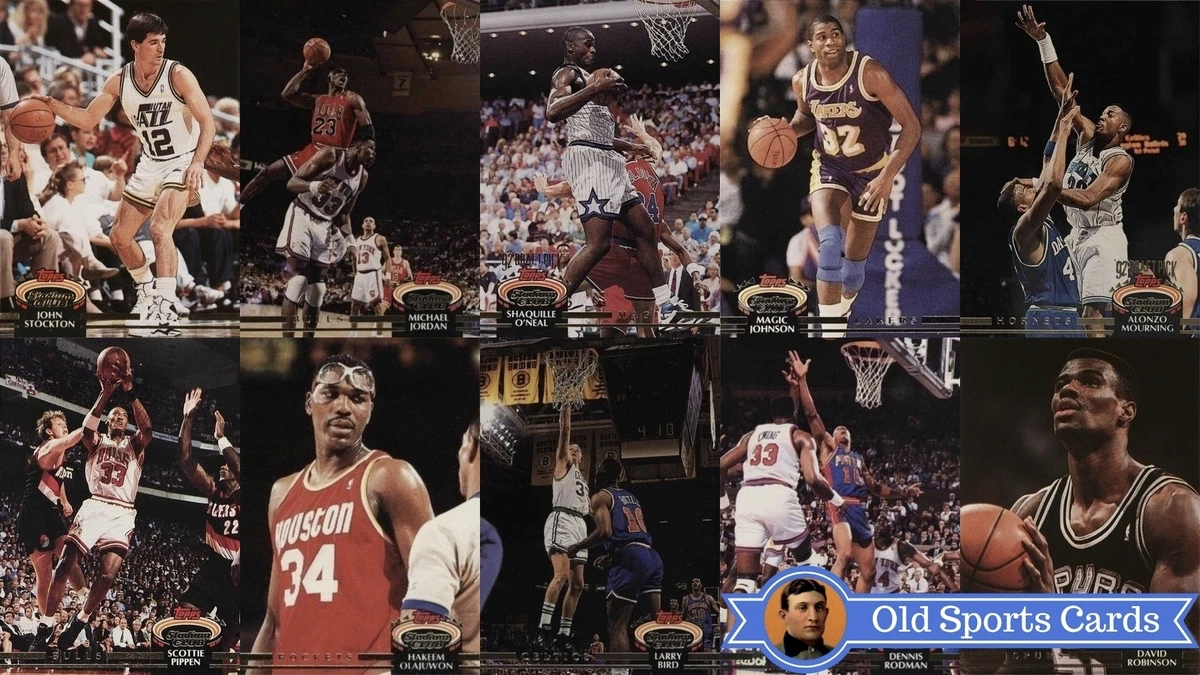
With basketball card collectors increasingly demanding a more premium experience, Topps answered the call with the 1992 Stadium Club basketball set.
The Stadium Club brand had already debuted in 1991 in the baseball and football card markets to a positive reception.
And basketball card collectors wanted the same...
Featuring images that used "high definition technology" and a borderless design, 1992 Stadium Club basketball showcased the game's biggest stars in a premium spotlight.
The 400-card checklist boasts countless beautiful action shots.
It also contained several high-powered rookie cards and one of the most popular inserts, Beam Team, of its era.
Put simply, this set marked an incredible milestone in the basketball card hobby.
And in this guide, we look at the 15 most valuable.
Let's jump right in!
1992 Stadium Club #1 Michael Jordan
Estimated PSA 10 Value: $225
The 1992-93 season was complicated for Michael Jordan.
As the calendar turned to '93, the Chicago Bulls icon sat at the center of a series of gambling scandals, which included a much-publicized gambling debt to a convicted cocaine dealer.
This may or may not have been the impetus for a two-season "retirement suspension" at the end of the campaign.
It's important to note that Jordan cites the July murder of his father, James, as a key reason for his hiatus and move to baseball.
Jordan was now a tabloid target.
Remarkably, it did not affect his game.
The two-time defending MVP won his seventh consecutive scoring title (32.6 PPG) and paced the league in steals (2.8), offensive win shares (12.0), and PER (29.7).
It wasn't his best season of the bunch, considering his career-high usage rate (34.7%) and decreased scoring efficiency (.495 FG%, down 4.4% from two years before).
Regardless, Jordan was still the sun around which everything orbited.
Named to his seventh All-NBA First Team and sixth consecutive All-Defensive First Team, there were no holes in the game of the greatest.
As usual, the playoffs were no different.
Jordan's series-ending dagger over Cleveland's Craig Ehlo is a forever highlight, yet that was just one of many otherworldly performances on Chicago's way to a three-peat.
The 29-year-old living legend averaged a playoffs-best 35.1 points (on 47.5% shooting) with 6.7 rebounds, 6.0 assists, and 2.1 steals in the Bulls' 15-4 stomp to a title.
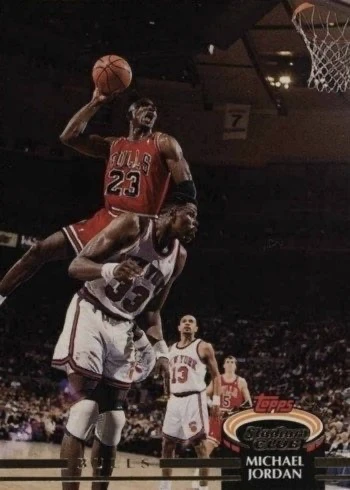
1992 Stadium Club #210 Michael Jordan
Estimated PSA 10 Value: $130
The 20-card "Members Choice" subset that bookended the end of Series 1 and the beginning of Series 2 showcased twenty of the NBA's biggest stars.
Besides their sequence in the set checklist, each "Members Choice" card is easily identified by a golden foil stamping along the bottom.
In some cases, a given player's "Members Choice" card may command a slight premium than his standard base card.
But in Michael Jordan's case, it's the opposite.
Any Jordan card is highly desirable.
But his base card is the clear winner of the two in this set.
While his base card sports an incredible action shot of him dunking over New York's Patrick Ewing, his "Members Choice" card is a bit bland in comparison.
Still, the up-close look at MJ presents the legendary superstar in a more personal style.
And many collectors appreciate that.
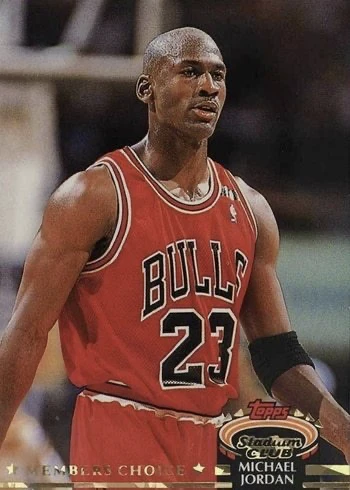
1992 Stadium Club #201 Shaquille O'Neal
Estimated PSA 10 Value: $65
Shaq's "Members Choice" card may carry a slight premium to it over his base rookie card.
But that's most likely because the amount of PSA 10 copies of his base card outnumber his "Members Choice" card by around 3 to 1.
That should tell you how crazy the market for his base rookie has been over time.
Throughout the early 90s, it was one of the hottest sports cards in the entire hobby.
And his legacy only furthered the demand over time.
Collectors who were kids back then still love this card and many have been quick to seek a PSA 10 example for their personal collections.
All that demand has pushed its price down relative to the "Members Choice" card, which has less of a following.
You gotta love the imagery on this card.
Shaq dwarfs Philadelphia's Armen Gilliam, a 6' 9" power forward who was solid year in and year out but never quite an All-Star.
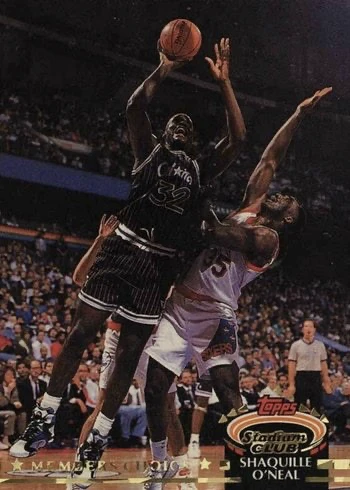
1992 Stadium Club #247 Shaq Rookie Card
Estimated PSA 10 Value: $60
One player can change everything for an NBA franchise.
After three years in operation, the Orlando Magic remained in desperate search for an identity.
Orlando averaged just over 23 wins during that period and lacked the size and talent necessary to win in the early 90s NBA.
All it took was a #1 pick to flip those fortunes around.
The team's upward trajectory began when LSU center Shaquille O'Neal put on a Magic uniform for the first time.
O'Neal was a rim-rocking, shot-swatting athletic freak: 7-foot-1, 325 pounds of pure post dominance.
O'Neal averaged a double-double in year one (23.4 PPG, 13.9 RPG) and posted career bests in blocks per game (3.5) and defensive rebound percentage (27.1%).
He wasn't yet the single-manned offensive wrecking crew he'd become, yet his rim-protecting powers were at their peak.
The Magic finished with their first non-losing record (41-41) as Shaq's popularity skyrocketed.
The first player since Michael Jordan to be named an All-Star and win Rookie of the Year, O'Neal's time in the limelight was only getting started.
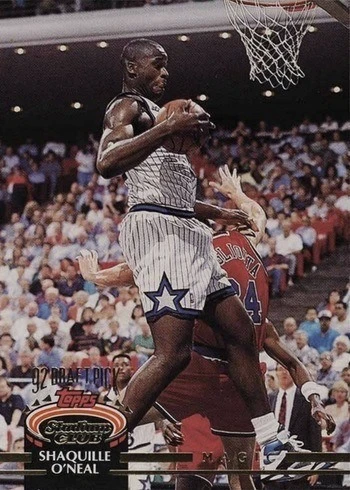
1992 Stadium Club #194 Larry Bird
Estimated PSA 10 Value: $50
Some basketball-shooting purists would occasionally point out the "flaw" in how Larry Bird would raise the ball near/over his head before releasing it.
And you can see that motion captured mid-shot perfectly on his "Members Choice" card.
Still, as "awkward" as some shooting experts may have deemed his style, none argued with the results.
Bird was one of the greatest shooters of his era.
Using his large frame and unique shooting style, Bird was a nightmare for opposing players to defend.
And whether inside or outside the perimeter, he could shoot with deadly precision.
His confidence made him even more lethal.
Just look at his performance in the three-point contest during the 1988 NBA All-Star Game.
To this day, the film of him burying that last money ball while raising his finger in a "number one" motion remains one of the best moments of his career.
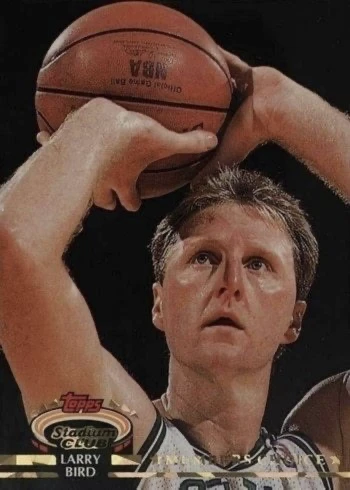
1992 Stadium Club #32 Magic Johnson
Estimated PSA 10 Value: $40
On November 7, 1991, Magic Johnson made the shocking announcement that he would retire from the NBA after testing positive for HIV.
For twelve seasons, Johnson had built a reputation as one of the best, if not the best, point guard in the history of the NBA.
His uncanny court awareness and flashy style of play made him the face of the "Showtime Lakers."
And then suddenly, he was gone.
Not only did his retirement shock the basketball world, but it also brought much-needed discussion regarding the growing concern around HIV.
Johnson quickly turned his attention to fighting HIV with as much fire as he had on the court.
Eventually, Johnson would return to the hardwood.
Beginning with an appearance in the 1991-92 NBA All-Star game, Johnson showed he still had plenty left in the tank by winning MVP honors.
Later, he was named as one of the members of the "Dream Team" that competed in the 1992 Olympics in Barcelona, Spain.
Despite initially intending to make a comeback for the 1992-93 NBA season, Magic ultimately decided to stay retired until making a brief 32-game comeback during the 1995-96 season.
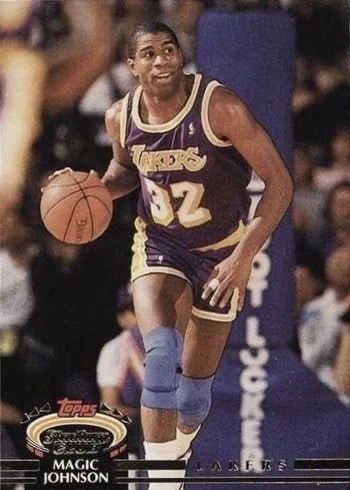
1992 Stadium Club #33 Larry Bird
Estimated PSA 10 Value: $40
On August 18, 1992, Larry Bird announced his retirement from playing professional basketball.
After the grind of hard-nosed play over 13 seasons, the wear and tear on Bird's body was just too much.
The injuries to his back were especially burdensome.
During games late in Bird's career, and even during the Olympic Games in Barcelona, Spain, that summer, the pain was so bad that he'd lie down on the sidelines rather than sit in a chair.
When Bird returned from Barcelona and announced his retirement, it didn't shock the basketball world.
But it still hurt.
Over his Hall-of-Fame career, Bird was one of the key players during the 1980s and early 90s who helped elevate the NBA to higher levels with his competitive play.
A twelve-time All-Star, three-time MVP, two-time Finals MVP, and three-time NBA champ, Larry Legend was simply one of the greatest of all time.
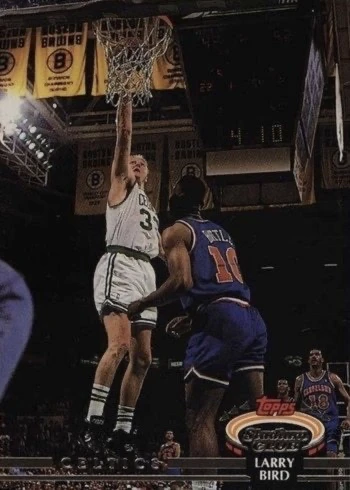
1992 Stadium Club #220 Hakeem Olajuwon
Estimated PSA 10 Value: $30
There's a reason why the NBA renamed the Defensive Player of the Year award in Hakeem Olajuwon's honor in 2022.
Just look at how Olajuwon towered over the competition in 1992-93.
His offensive numbers were fantastic: 26.1 points per game on 52.9% shooting and a career-high 7.9 offensive win shares.
His defensive numbers, on the other hand, were unreal.
Olajuwon was a one-man no-fly zone.
He led the NBA in blocks per game (4.2) and block percentage (6.5%). Opponents were often forced into contested mid-range and perimeter jumpers just because he was lurking in the paint.
No other player altered the flow of a game like Olajuwon.
His first of two consecutive Defensive Player of the Year awards was, in all honesty, a mere formality.
The 55-27 Rockets won the Midwest Division but could not get past Seattle in a classic seven-game NBA Western Conference Semifinal.
Still, Olajuwon's 1992-93 season resonates and lives on through the award that now bears his name.
"That's the crown," Olajuwon said of the newly rechristened honor. "That sealed my career. It can't be anything higher than that."

1992 Stadium Club #297 Alonzo Mourning Rookie Card
Estimated PSA 10 Value: $30
The Charlotte Hornets were in business for four seasons before they selected Alonzo Mourning with the second pick of the 1992 NBA Draft.
It took just 49 games for Mourning to rewrite their record books.
The Georgetown product became the franchise's all-time leader in total blocks by the end of February, totaling 196 swats before Game #50.
The 22-year-old center's presence dragged Charlotte's otherwise bad defense to respectability.
It also shot the franchise from the bottom of the league ladder to its first winning record (44-38).
A distant second to Shaquille O'Neal for NBA Rookie of the Year, you could argue that Mourning's year was on the same level.
While Mourning's averages of 21.0 points and 10.3 rebounds fell shy of O'Neal, he played four minutes less per contest and posted near-identical Per-36 totals.
He also matched Shaq with 3.5 blocks per game on a lesser-minute load.
Mourning's Hornets also did something that Shaq's Magic did not do: they made the postseason.
They even won a series in their first-ever playoff appearance, downing Boston three games to one in the Eastern Conference First Round.
Mourning averaged a near double-double (23.8 points, 9.9) rebounds with 3.4 blocks per game in nine postseason contests.
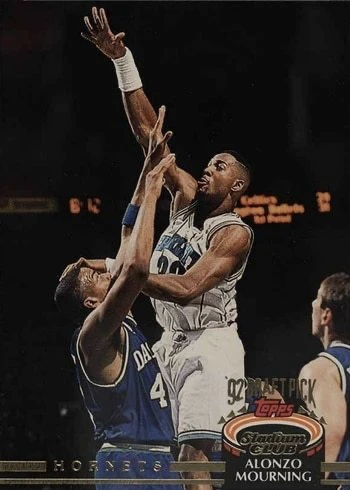
1992 Stadium Club #314 Dennis Rodman
Estimated PSA 10 Value: $30
Dennis Rodman, the player, and Dennis Rodman, the person, were always at odds.
His 1992-93 season is a prime example of that rift.
The 31-year-old Detroit Pistons power forward controlled the boards better than anyone.
He coupled reckless tenacity with picture-perfect body positioning to top the NBA in total rebounds (18.3) for the second consecutive season.
He was also a top on-ball defender, forcing bad shots while keeping track of his body for the following box-out.
Rodman was a two-time Defensive Player of the Year and two-time NBA champion.
He was unquestionably elite.
Yet, when's enough enough?
After Pistons coach Chuck Daly's resignation during the offseason, Rodman lost the page.
Without his friend and confidant, Rodman skipped camp and flat-out refused to go on a team road trip.
He was a constant distraction and also a danger to himself.
In February 1993, Rodman was found sleeping in his truck with a loaded rifle outside the Pistons' arena.
As Rodman's life fell apart, the 40-42 Pistons finished outside the playoffs for the first time since 1984.
The mercurial star would be shipped to San Antonio within months.
More chaos and controversy awaited.
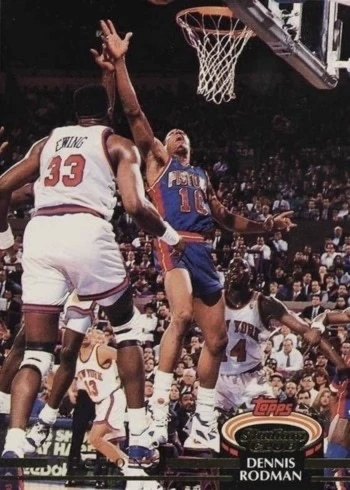
1992 Stadium Club #360 Charles Barkley
Estimated PSA 10 Value: $30
Charles Barkley had no better chance to get his ring than in 1992-93.
The Phoenix Suns acquired the Hall-of-Fame power forward just days after the 1991-92 campaign, an over-the-top move for a team coming off a fourth consecutive 50-win season.
After his stint on the 1992 Dream Team, Barkley came to the Suns in the best shape of his playing career.
What came next was an epic all-around season that lifted Phoenix from contending status to an NBA-best and franchise-best 62-20 record.
Barkley averaged a 25.6 PPG/12.2 RPG double-double, finishing fifth and sixth in the NBA, respectively.
Other players had more eye-popping stats, yet Barkley's seismic impact on the Suns' championship hopes captured him 59 of 98 first-place votes for his first-and-only NBA MVP.
Just the third player to win MVP honors a year after a trade, Barkley played an NBA-high 24 playoff games in '93, averaging 26.6 points and 13.6 rebounds as Phoenix took the West for the first time since the '76 Playoffs.
It ended in pain.
Phoenix cut a 2-0 deficit to 3-2 with two out of three wins in Chicago, yet got dropped by a John Paxson killer with seconds left in Game 6.
Barkley's elusive ring remained as such and would for the rest of his career.

1992 Stadium Club #361 David Robinson
Estimated PSA 10 Value: $30
"The Admiral" steered the 1992-93 San Antonio Spurs through choppy waters to a fourth consecutive playoff berth.
The Spurs hired UNLV coaching legend Jerry Tarkanian to man the bench in 1992-93 and promptly fired him after a 9-11 start.
Tarkanian struggled with the basics and was completely flattened by the pressures of the pro game.
"The losses have been really painful," Tarkanian said after his firing. "It's really been hard on me. I've been taking medication for high blood pressure, and I've never done that before."
The Spurs eventually righted the ship under new head coach John Lucas, but David Robinson held the wheel.
As even-keeled as ever, the 27-year-old center averaged 23.4 points, 11.7 rebounds, 3.7 assists, 3.2 blocks, and 1.5 steals in 39.2 minutes per game.
He finished second in the NBA Defensive Player of the Year race, just a step or two behind the great Hakeem Olajuwon as a paint defender.
Robinson's consistency made him integral and irreplaceable for the Spurs during a season of upheaval.
And he remained just as steady in 10 postseason contests with averages of 23.1 points, 12.6 rebounds, 4.0 assists, and 3.6 blocks in 42.1 minutes per game.
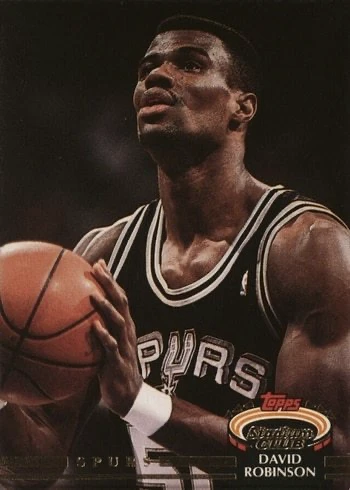
1992 Stadium Club #367 Scottie Pippen
Estimated PSA 10 Value: $25
The 1992-93 Chicago Bulls may have been the least bulletproof of the franchise's six title teams.
The grind was evident when Michael Jordan and Scottie Pippen returned from their gold-medal win in Barcelona.
Even with rest during camp, Jordan limped through foot and wrist problems all year, and an ankle injury slowed Pippen.
"It was hard," Pippen said. "We had no way of knowing what that season was going to be like, especially for me and Michael, playing in the Olympics. It helped, to a certain degree, that we had already won two championships and knew how that could wear a team down, but really, nothing could prepare us for all the non-stop basketball."
However, this is the Bulls dynasty we're talking about.
Even at their most vulnerable, the Jordan/Pippen duo finished 1/2 in All-Star fan voting again as Chicago surged through a 35-17 first half.
By season's end, Chicago had the second-stingiest scoring D in the NBA, and Pippen found himself alongside Jordan on the league's All-Defensive First Team.
Pippen ended the regular season with averages of 18.6 points (on 47.3% shooting), 7.7 rebounds, 6.3 assists, 2.1 steals, and 0.9 blocks in 38.6 minutes per game.
He boosted his scoring average over 20 in the postseason (20.1), tacking on 6.9 rebounds, 5.6 assists, and 2.2 steals per contest en route to another trophy presentation.

1992 Stadium Club #265 John Stockton
Estimated PSA 10 Value: $20
You can say all you want about never winning the big one, but you can't deny the staying power of Karl Malone and John Stockton.
The Utah Jazz duo set individual and tandem records with 19 consecutive playoff appearances from 1985 to 2003.
It was a match made in basketball heaven.
Malone was an efficient scorer and beast on the block, and Stockton was a passing artist who could find him from any angle and any part of the court.
In 1992-93, Stockton led the league in assists for the sixth consecutive season (12.0), many of those adding to Malone's scoring average of 27.0 points.
Now a five-time All-Star and four-time All-NBA Second Teamer, the 30-year-old prided himself as a pass-first facilitator.
Yet, it's easy to forget just how deadly of a shooter he was.
Stockton averaged 15.1 points on his own accord, shooting 48.6% from the field and 38.5% from three.
He hit countless shots on the catch and used pass fakes to open up uncontested jumpers with regularity.
The Jazz finished 47-35 on the year, good for a tenth consecutive playoff spot.
Their postseason run lasted just five games.
Seattle erased a 2-1 series deficit to beat the Jazz in a five-game First Round series, once again denying Stockton and Malone a taste of postseason glory.
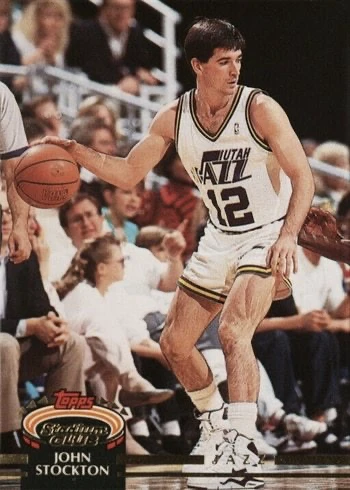
1992 Stadium Club #357 Reggie Miller
Estimated PSA 10 Value: $20
The 1992-93 Indiana Pacers were a year away.
Reggie Miller wasn't, but the rest of the team was.
Under head coach Bob Hill, the Pacers' top-five rated offense was undone consistently by a defense that finished 21st out of 27 teams in defensive rating.
There was a visible lack of polish and effort on D and it cost Indiana several winnable games on their way to a 41-41 record.
Reggie Miller did everything he could to shoot the team's obvious deficiencies away.
The 27-year-old shooting guard averaged 21.2 points per game (on 47.9% shooting) and narrowly missed his third 40% campaign from three (39.9%).
He was Mr. Clutch, a generational sharpshooter that propelled a suspect Pacers squad to a fourth straight playoff appearance.
After a 3-1 First Round loss to the Knicks, it was clear that the Pacers needed a new voice off the bench.
Hill was fired after the season and replaced with the great Larry Brown, the man who would lead them to back-to-back Eastern Conference Finals in 1994 and 1995.
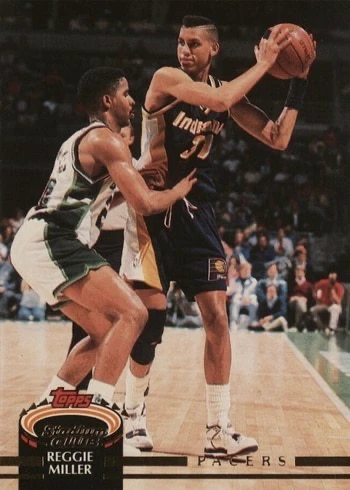
1992 Topps Stadium Club Basketball Cards In Review
At one time in hobby history, the Shaq and Alonzo Mourning rookie cards were the talk of the town.
Collectors couldn't wait to get their hands on one.
And they ripped through packs hoping to find one staring back at them.
It's difficult to stress just how much those two, especially Shaq, took the basketball world and the hobby by storm back then.
Rookie cards of Christian Laettner, Latrell Sprewell, Robert Horry, Harold Miner, and Tom Gugliotta were all once big chases, too.
Today, only the Shaq and Mourning rookies hold up well, largely due to their emergence as Hall-of-Famers.
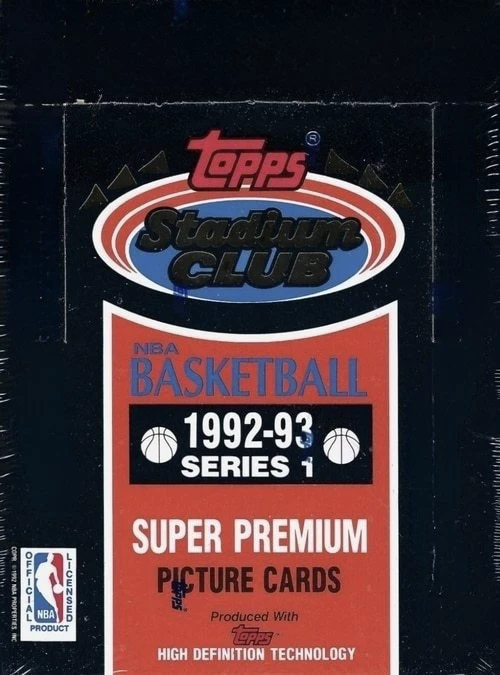
Still, most will remember 1992 Stadium Club basketball for its incredible imagery and high-quality collecting experience.
Ever since Upper Deck set the tone in 1989 with its baseball card debut, collectors were more and more demanding higher-quality cards.
And this set delivered.
It's fun looking back through the checklist and seeing all the big-name superstars, many of whom even show up on other players' cards as well.
The Beam Team inserts will continue to far outpace the base cards in terms of value, but the nostalgia will always remain.
